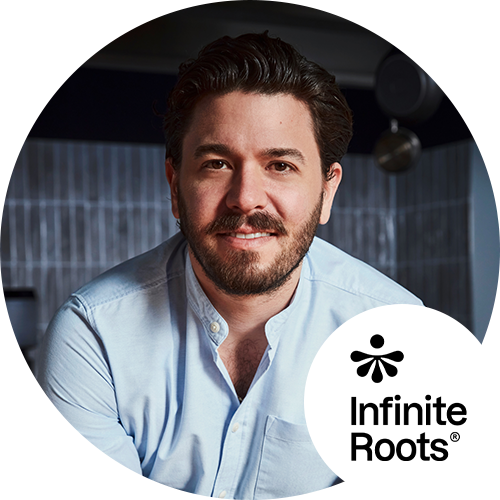
Dr. Mazen Rizk is Founder and CEO of Infinite Roots (fka Mushlabs). He started the company in 2018.
Mazen was born and raised in Byblos and after completing his Master's degree in Molecular Biology in 2009 at the Lebanese American University, he moved to Germany and completed his PhD in synthetic biotechnology at the Technical University of Hamburg in 2014, focusing his research on biofuels.
After that, Mazen worked at Ohly, the world's third-largest producer of yeast extract. He spent his time on developing products for sugar and salt reduction for consumer products, as well as prebiotics and antibiotic replacements in animal feed.
It was during this work that he developed the basic concept for Infinite Roots: the cultivation of mushroom roots, mycelium, in a time- and resource-efficient fermentation process. The result is one of the most sustainable and transformable foods in the world.
Today, Infinite Roots comprises a team of nearly 70 employees from over 20 countries and has recently announced its $58 million Series B round, marking the largest single investment round in mycelium technology in Europe to date. For Mazen, it's a place where diverse visionaries and experts from around the world come together to find solutions for the future. With a new generation of sustainable food and a revolutionary and safe production process, Mazen wants to create a secure and sustainable food system.
Have you ever wondered if there could be a protein derived from mushroom roots (mycelium) underground with a natural "meat-like" structure and eco-friendly? With fermentation techniques, biotech company Infinite Roots creates mycelium protein that rivals animal protein in terms of nutrition, flavor, and texture. It uses minimal land, and water, producing 110x faster than traditional agriculture, cutting carbon footprint.
Regenerative agriculture technology, bio-synthetic materials, and biodegradable packaging significantly conserve the environmental resources required for food production. As the "primary productive force," how does technology inject new vitality into sustainable food production? From production to processing, and then to packaging and transportation, how can each link in the food production chain leverage the limitless potential of technology to form a green industrial value chain? Let's explore the sustainable models of the food industry driven by technology together.

